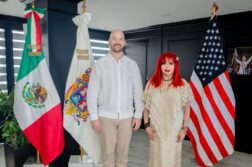Lisette Voytko Forbes Staff
TOPLINE
Coronavirus vaccines developed by Pfizer and partner BioNTech are being tested on healthy young adults in the U.S. in a flexible, simultaneous trial of multiple candidates that researchers hope will shorten the development time for a COVID-19 vaccine.

OXFORD UNIVERSITY POOL VIA AP
KEY FACTS
The trial is testing four different versions of a vaccine at the same time, instead of the typical vaccine development process, which can take years of animal experiments before a candidate is tested in humans.
The first five U.S. vaccinations were given to people Monday, the Washington Post reported, and follows doses given to people in Germany (where BioNTech is located) last week.
Initial volunteers for the U.S. trial must be between 18 and 55 years old, and Pfizer says older people will not be enrolled until at least one of the vaccinated candidates shows it is safe and produces some level of immune response.
The U.S. trial will eventually enroll 360 people for the study, according to a Pfizer press statement.
BIG NUMBER
Millions to hundreds of millions. Pfizer says that if it finds a vaccine candidate, it could produce millions of doses by the end of 2020, and could scale production to hundreds of millions by next year.
CRUCIAL QUOTE
“With our unique and robust clinical study program under way, starting in Europe and now the U.S., we look forward to advancing quickly and collaboratively with our partners at BioNTech and regulatory authorities to bring a safe and efficacious vaccine to the patients who need it most,” said Pfizer chairman and chief executive Albert Bourla in a statement.
KEY BACKGROUND
Pfizer and BioNTech’s coronavirus vaccines are being developed with genetic material known as messenger RNA, or mRNA.
The material contains instructions for cells to make proteins, according to the New York Times, which means the vaccine potentially could tell a person’s cells to make a specific coronavirus protein without them getting sick.
No mRNA vaccine, however, has been approved for the prevention of infectious disease. Moderna, Inovio and CanSino are among other pharmaceutical companies working on similar vaccines, the Times reported, and some have also gone into human trials. Typical vaccine production can take 10 to 15 years, and health experts have said a coronavirus vaccine was—at minimum—12 to 18 months away.
At least 70 coronavirus vaccines are in development, the World Health Organization said on April 14, 2020.





